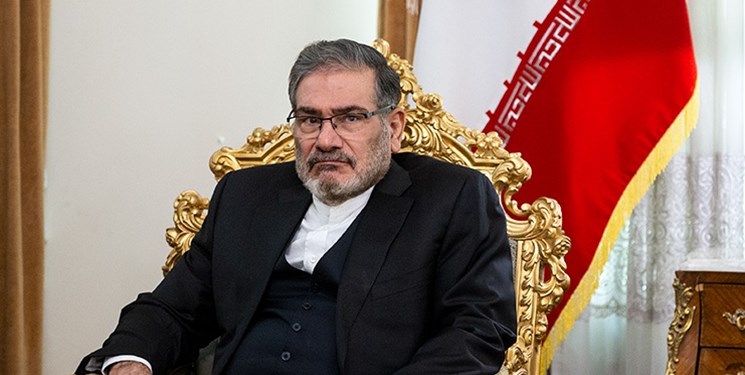Top Security Official: Iran’s Economy Not Tied to Negotiations
Secretary of Iran's Supreme National Security Council (SNSC) Ali Shamkhani emphasized that Tehran does not tie its economy to the results of the talks with world powers, and further underlined that the country will not cross its redlines at all.

Shamkhani held a meeting with a group of Iranian lawmakers, who sit on the Parliament’s National Security and Foreign Policy Committee, to brief them on the latest developments in the Vienna talks. The security chief provided them with a comprehensive report about the process of the negotiations, reviews of the EU coordinator’s initiatives, and Tehran’s views on the proposals.
The SNSC secretary reaffirmed the government’s pivotal policy of not tying the Iranian economy to the outcome of the talks.
He underscored that the law adopted by the parliament, titled the Strategic Action Plan to Lift Sanctions and Protect the Iranian Nation’s Interests, “places very good capacities for following up on the policy of active resistance at the disposal of the country”.
The top security official praised the Iranian negotiating team and other institutions involved in the process for exerting round-the-clock efforts toward achieving final results.
“Regardless of achieving or failing to achieve a deal, no red line was crossed or will be crossed thanks to the good coordination among different sectors of the country,” Shamkhani noted.
During the session, which was also attended by Foreign Minister Hossein Amir Abdollahian and Head of the Atomic Energy Organization of Iran (AEOI) Mohammad Eslami and top nuclear negotiators Ali Baqeri Kani, the legislators received answers for their questions revolving around various aspects of the EU’s proposal.
During the meeting, Baqeri Kani and Eslami also provided explanations to the MPs and answered their questions.
Late on Monday, Iran confirmed it had provided the European Union with its final conclusion on the talks aimed at reviving the 2015 accord, emphasizing that it is now the US turn to show realism and flexibility if it really wants a final agreement to be reached.
The EU has confirmed that it has received Tehran’s response, saying the bloc is “studying” the reply with parties to the deal and Washington.
“We are studying it and are consulting with the other JCPOA (Joint Comprehensive Plan of Action) participants and the US on the way ahead,” Nabila Massrali, a Spokesperson for EU Foreign Policy Chief Josep Borrell, stated.
Earlier, Amir Abdollahian urged the United States to be flexible and realistic to let the negotiations yield fruit, and warned that Tehran has its own “Plan B” and it will go into effect if Washington fails to make a political decision to revive the accord.
“We also have our own Plan B, but this issue must be resolved through talks,” Amir Abdollahian stated on Monday, referred to the US claim that it has a Plan B in case the talks fail.
The foreign minister said if the US acts realistically and flexibly, Tehran and the other sides will reach a deal in the coming days.
“We are at a point that can be the beginning of the conclusion of a deal, but it depends on the US how long it will take before reaching an agreement. Washington knows very well how much flexibility we have shown, now it is the turn of the American side to be flexible,” the top diplomat continued.
Elsewhere in his remarks, the top official said Iran and the P4+1 have done what is necessary, adding that the Vienna talks made “progress” but Tehran does not want to enter into an agreement which would make no changes on the ground.
The minister stated Tehran and Washington are exchanging messages on three issues and that Iran will announce its views in the next few days.
Iranian diplomat stressed that the US side showed flexibility regarding two issues in words but this must be in practice, urging Washington to also show flexibility about the third issue, namely guarantees.
“We told Americans that if our opinions on these three issues, which are reasonable opinions, are respected, we are ready to enter the stage of announcing an agreement and hold a conclusion meeting,” Amir Abdollahian concluded.
Iran and the five remaining parties to the nuclear deal have held several rounds of negotiations since April last year to restore the agreement, which was unilaterally abandoned by Donald Trump in May 2018.
In quitting the agreement, Trump restored sanctions on Iran as part of what he called the “maximum pressure” campaign against the country. Those sanctions are being enforced to this day by the Joe Biden administration, even though it has repeatedly acknowledged that the policy has been a mistake and a failure.
Iranian officials say the ball is in the US’ court, and the Biden administration should assure Tehran that it will not repeat Trump’s past mistakes.
Iranian officials have also criticized Washington for raising excessive demands from Tehran during the nuclear talks, and blocking efforts to reach an agreement on the JCPOA. They emphasized the Tehran’s will to reach a good, strong and lasting agreement, and stressed that the US should lift unilateral sanctions, and assure Iran that it will not repeat its past mistakes.







